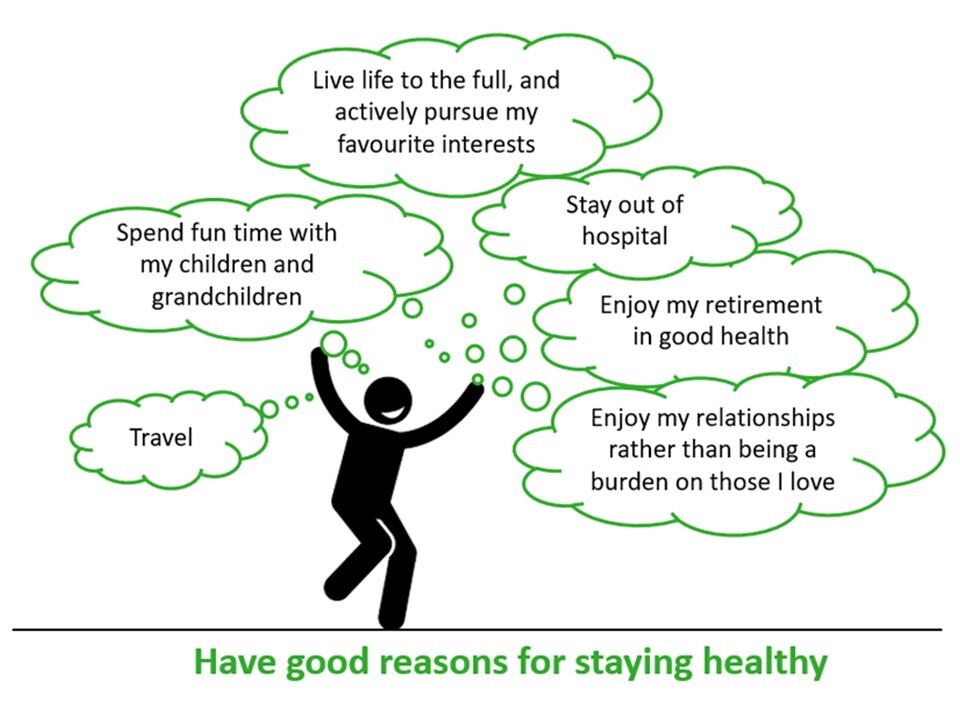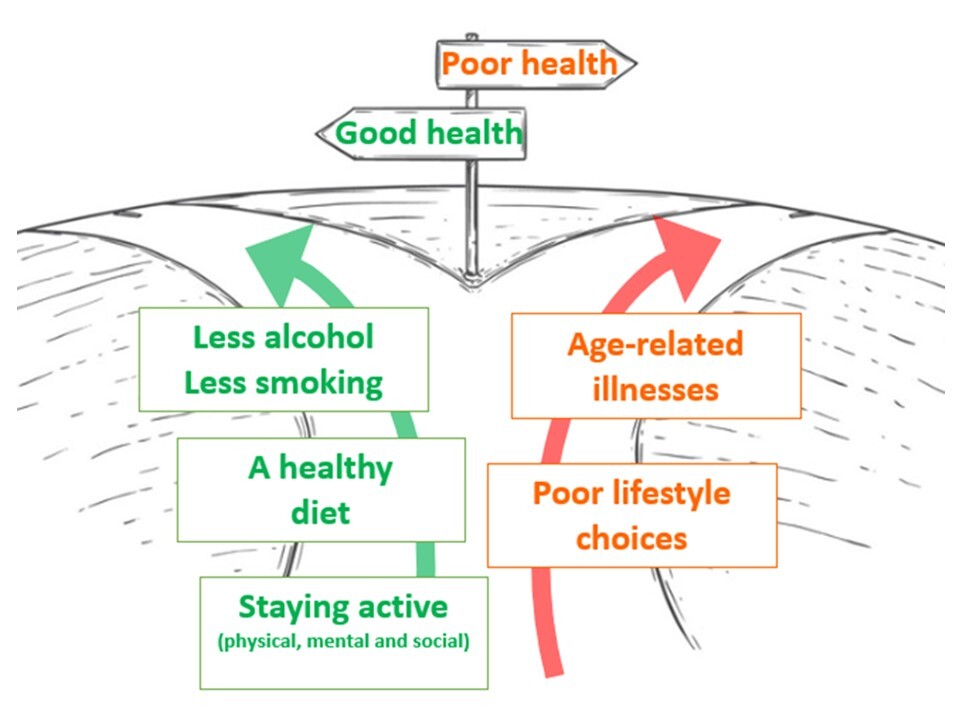Most of us know what we need to do to pursue a healthy lifestyle – like eating healthy food, getting enough exercise, not smoking, not drinking too much alcohol, and eating only as much as we need.
However, it isn’t enough to know this – we also need to do it. How can we increase the chances of doing what we know is good for our health?
Here are our top tips, based on findings from health psychology, successful public health initiatives, and from studies of what influences our behaviour.
This article will help you achieve a healthy lifestyle:
- Have a good reason for staying healthy, and keep this at the front of your mind
- Remember that there are people who can help you
- Think about what works for you
- ‘ExercisePLUS’
- Understand why we’re sometimes tempted
- Make a plan
- Conclusions
Have good reasons for staying healthy, and keep these at the front of your mind

Some researchers believe we need more immediate goals and objectives, so also to think about the process of exercising, eating more healthily, and taking more care of yourself generally. A study across 11 countries into responses from patients with obesity found that there were positive attitudes towards setting goals and the importance of exercising regularly and managing weight. By following this process of setting goals, patients increased their motivation to lose weight.
Here are some examples of setting personal goals:
- Learn something new or set yourself a new routine: for example, learn how to cook for family and friends, learn a new language.
- Contribute to your community: for example, help others to be more active or to eat more healthily.
- Take on a new personal identity: for example, train to become a runner and take part in a popular charity race.
Enjoying this process, or seeing it making a difference for us and for others (rather than just aiming for a single outcome like losing weight), can be a particularly powerful motivator for staying healthy.
Remember that there are people who can help you
If you want to give up unhealthy, compulsive behaviours, such as smoking or drinking alcohol, there are a number of organisations that can help you.
Weight-loss programmes
If you want to lose weight, there are many reputable support organisations. For instance, a 2017 trial found that, on average, participants on a 12-week Weight Watchers programme lost weight. Some participants lost even more weight when they followed the programme for a year.
However, some studies have suggested that some people regain the lost weight in subsequent years.
So it probably helps to see these kinds of weight-loss programmes as a lifestyle choice that becomes a regular habit, rather than as a ‘quick fix’.
Exercise and fitness classes
Your local adult education centres will usually have exercise, dance and fitness classes where you can benefit from tuition and peer support. These centres may also offer classes to exercise your brain, which may help prevent or delay dementia.
Your local leisure centre might also be another useful source of help and support for being physically active and staying healthy.
Family and friends
Friends, colleagues and family members are another potential source of support. You may find walking or running with a friend, colleague or member of your family (sometimes known as ‘buddying’) more enjoyable and easier to keep up with than doing it on your own.
Technology
Technology can also help you. ‘Wearable’ trackers, such as devices that count the number of steps you take, may not always be 100% accurate, but they can become quite compulsive and seem to help some people maintain their exercise routines or achieve their exercise goals.
Professional guidance
In recent years, the importance of having a professional to guide you through all these helpful ways of living a healthy lifestyle has been recognised. The NHS has introduced a ‘personalised care agenda’, which focuses on people’s ability to take care of their own health and wellbeing by following a dietary and exercise routine that is adapted specifically for them.
If you’re finding it difficult to follow a healthier lifestyle, this personalised care, with the support of a health and wellbeing coach, encourages and motivates you to become independent, and to be aware of what works best for you. This in turn may lead to a practical, tailored change for you to a healthier lifestyle.
Think about what works for you
Our own research, following interviews with over 1000 adults in England, suggests that we often experience trigger points in our lives that prompt us to adopt a healthier lifestyle.
Examples of trigger points include a health ‘wake-up call’ (if we or someone close to us has a health scare); having children; getting older; not fitting into our clothes, or getting out of breath when we walk up the stairs. Appearance can also be a strong motivator. For instance, one person we interviewed planned her weight loss around an annual schedule of social and business events. She used her appearance at each upcoming event as a short-term trigger to control her weight. So, think about what trigger points in your life might work for you.
Also, think about times when you’ve been most successful at leading a healthy lifestyle. What was it about those times that made this possible? Then, if it is still feasible, try to repeat what worked for you previously.
You can also think about situations when you’ve been easily distracted from reaching your goal. Which situations represent the greatest risk for you? For example, do you tend to eat more if you are bored, or if you are upset? Can you find ways to avoid, or at least reduce, these kinds of situations?
’ExercisePLUS’
When we researched which initiatives seemed most effective at encouraging people to be physically active, we found that the most successful initiatives also provided what we describe as ExercisePLUS: in addition to the health benefits of physical activity (exercise), at least one further motivator was provided (PLUS). Examples of the additional PLUS benefits include:
- fun/enjoyment (typified by Zumba’s US slogan, ‘Ditch the workout. Join the party’)
- a sense of belonging (e.g., a local organiser described Park Run as ‘the new church – you feel embedded in the local area’.)
- raising money for a good cause (as with Race for Life)
- involvement with a professional sports team you support (as with Football Fans in Training, FFIT)
- an opportunity to enjoy nature and the outdoors (e.g., Forest Schools).
Given the reported gap between people knowing they should be doing more physical activity and actually doing it, ExercisePLUS seems to help provide the extra impetus many people need.
Behavioural economics suggests people tend to undervalue long-term investment in favour of immediate gratification. Physical activity which is enjoyable overcomes this obstacle by providing that immediate gratification.
This suggests that when we exercise, we find great value from the additional benefits, which, with the obvious health benefits of exercise, help to motivate you.
Understand why we’re sometimes tempted
For thousands of years, food was often scarce or difficult to obtain for humans, so it made sense for us to eat whenever the opportunity arose. We’re arguably programmed to ‘consume’ in the short term, rather than think of the long-term consequences.
However, we now live in a world where food and financial credit are both available all year round and from a range of sources. This is part of what has been described as an ‘obesogenic environment’. Perhaps the way our bodies were programmed thousands of years ago is now putting us at risk.
|
We may be tempted to eat or drink even when we’re not really hungry or thirsty. Understanding this temptation and its possible consequences can help us to overcome it. Think with your brain and not with your stomach. |
But what makes us human is also our ability to learn, to reason, to look ahead and to predict the consequences of our actions. We just need to remember to keep using this ability.
Make a planStarting with small steps is probably the most realistic and effective approach to improving and maintaining your health. For example, if you’re planning to walk more, plan to start with distances you can manage.
|
‘A journey of a thousand miles starts with a single step.’ The Chinese philosopher, Laozi |
Work out when and where you need to do things, and plan to remind yourself of that time and place. For example, a plan to eat more healthily might include preparing shopping lists featuring healthy food; having some healthy menus to hand in the kitchen; putting away your largest plates, and using smaller plates to automatically reduce the size of meal portions.
As with any plan, though, we need to make sure that we follow it! An effective way of doing this is to keep a diary of what you’ve actually done with regards to exercise, eating, drinking or smoking.
Conclusions
- Have a good reason (or several!) for staying healthy, and keep this at the front of your mind.
- Choose healthier activities to help you take greater control of your life.
- Remember that there are people, organisations and technology that can help you, including NHS health and wellbeing coaches.
- Look for additional non-health benefits: ExercisePLUS.
- Do what works best for you personally.
- Think with your brain, not with your stomach.
- Make a plan, and monitor it, but don’t be afraid to start with small steps.
Reviewed and updated by Norin Begum, June 2022. Next review date, May 2026.
_________________________________________
Other relevant articles on the Age Watch website:
- Fitness: Keeping fit: Why bother?
- Fitness: Can too much exercise be bad for you?
- Fitness: Walking and health
- Ageing: Healthy ageing – A life course approach
- Ageing: Healthy living
- Diet: What determines our food choices – and how does this affect our health?
- Diet: How to ensure that we eat more healthily
- Illnesses: Dementia

